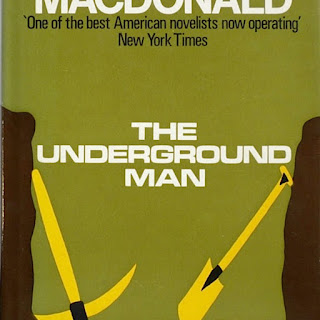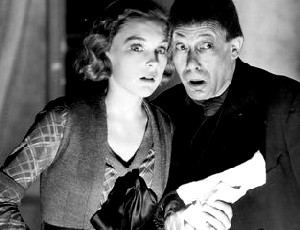"I seem to be moving further in the direction of the 'mainstream novel,' a development which is deeply satisfying to me."--Ross Macdonald on his novel The Goodbye Look, 1968
I don't know how often these days the phrase "transcend the genre" is used wholly un-self-consciously, but it once was used with great seriousness when referring to certain pet crime writers of the literary set, like Raymond Chandler. Dashiell Hammett, Patricia Highsmith, Eric Ambler, Ross Macdonald, PD James and Dorothy L. Sayers, to name a few names. Certainly all these writers excelled within the genre, but how many of them actually transcended it? I assume by this phase what is meant is that they began writing "mainstream literature," with murders.
 |
| a book as dull as its cover |
In some cases, at least, I think the ostensible transcendent mystery writer simply began writing dull novels, be they mainstream or mystery. Having completed The Underground Man (1971)--the bestselling detective novel by Ross Macdonald that was famously raved in a 3000+ word review by noted mainstream literature writer Eudora Welty in the New York Times ("Mr. Macdonald's writing is something like a stand of clean, cool, well-branched, well-tended trees in which bright birds can flash and perch. And not for show, but to sing.")--I have to conclude that Ross was lured to his artistic destruction by such siren singers as Miss Welty. No doubt they meant him well, but they enticed a talented mystery writer away from writing entertaining mysteries into composing rather dull ones--or mainstream novels, if you will so have it.
I personally think Ross Macdonald's books got progressively worse between his first critically raved bestseller, The Goodbye Look (1969) and his last one, the convoluted The Blue Hammer (1976). The Goodbye Look still paid some attention to the elements of mystery plotting, while in The Underground Man, RM's series sleuth, Lew Archer solves the case simply by having gobs of information handed to him when we get near the point for the novel to end. One gets the impression that Ross is not even really trying anymore, with respect to ingenuity in the mystery plotting, which had been one of his cardinal virtues. (At his best Macdonald was a much stronger plotter than either Chandler or Hammett.)
The mystery is yet another one by RM with murders and other misdeeds committed fifteen years in the past, but there's nothing particularly clever or ingenious about any of it. Rather it's all just arduous, both to write, no doubt, and to read. There's not a single memorable character in the book, unless it's the little boy who ends up getting kidnapped in chapter one. (There's a nice scene there, probably drawn from real life, of Lew Archer and the boy feeding peanuts to blue jays.) Otherwise it's Ross' usual miserably unhappy middle-aged couples, imperious oldsters and misunderstood youth, much more dully and lifelessly presented than ever in the past.
There's also a forest fire raging across California in the book, which initially lends some excitement, but that burns itself it out soon enough, while the book itself meanders onward. (By my count it's around 100,000 words, making it much longer than most of his earlier books, written back when he was an economical writer.) I gather the fire is supposed to be symbolic of something--the troubled times, or something of the sort. The point of the novel mostly seems to be about how elders screw up their children, which no doubt caught the tenor of the time, when the "generation gap" was much discussed. One is reminded of the Philip Larkin poem with the memorable line "They fuck you up your Mum and Dad." Larkin said in seven words what it takes Ross 100,000 to get across. There is something to be said for elegant brevity.
Near the end of the novel Lew Archer goes into full family counsellor mode with such pearls of wisdom as "You have the chance to put it back together. You're the only one who can." and "Let her know you're human, anyway." The days when Lew slugged it out with both cops and killers are long gone, though latterly he might possibly talk someone to death.
RM's young people aren't very convincing, being ultimately too sentimentally presented. They awkwardly use some Seventies lingo and neither they nor anyone else in the book actually uses any real bad language. Why was Ross so squeamish on this score, by the by? Even Chandler used bad words, albeit with a dash, three decades earlier.
 |
| a happy couple |
I get the feeling that Ross was trying to mediate his own personal traumas with his own lost daughter in these later novels, but it's much better done in earlier books. It's a great irony that this solemn bore of a book sold 50,000 copies in hardcover, over ten times as many as some of his earlier mystery masterpieces, like The Galton Case, which is actually a clever mystery while managing to present some moving characters and present some compelling themes as well. Does The Galton Case "transcend the genre"? Damned if I know, but at least it's a damn fine detective novel, from both the puzzle and character standpoint. I can't ask for more than that myself.
At least Eudora Welty got closer to Ross as a result of it all, though I don't believe RM's wife, crime novelist Margaret Millar, was crazy about that! (Indeed, in that sense Eudora's New York Times review might be deemed a highly literary mash note.) By the way during this period Millar wrote two superior books, considered both as mysteries and novels. they are Beyond This Point Are Monsters (1970)and Ask For Me Tomorrow (1976). By all means read them. Ross Macdonald enjoyed after long last achieving bestseller status in his lifetime; his wife was not so fortunate.

.jpg)
.jpg)
.JPG)
.jpg)
